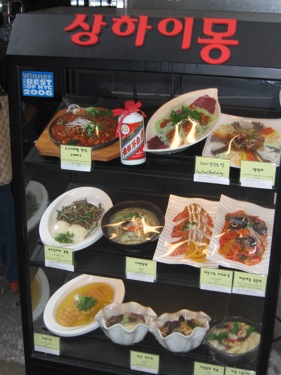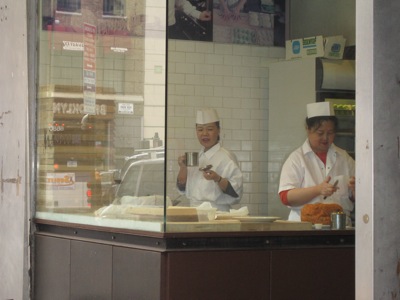Koreatown: What's Real
From Decoding New York
| Introduction |
| Little Italy |
| * Evolution |
| * Here v. There |
| * Economy |
| * What's Real |
| Koreatown |
| * Evolution |
| * Here v. There |
| * Economy |
| * What's Real |
| Comparison |
| * Photo Gallery |
| * Sources
|
There is a saying that there is nothing more real than the information straight from the horse’s mouth. No information can be more accurate about the neighborhood and the change it went through than the information from the interviews of Koreatown employees and its visitors. The following six interviews provide all the necessary and interesting information to feel the attitude of people towards Koreatown and how their experiences in the United States reflect the important aspects of immigration generally.
Semi C. works as a salesperson at a retail shop where she got the job through her uncle who used to work there. Semi was born in Korea. She came to the United States a year and a half ago with her family and plans to stay here. Semi lives in Flushing, where many of her relatives reside as well. She is currently attending Borough of Manhattan Community College and studying Business Education. Asked why she doesn’t want to go back to Korea, she answered, “Korea has a lot of social problems. They [Koreans in Korea] are always busy busy. They are tight.” Semi doesn’t really like Koreatown either. She said there is no diversity here. “The food isn’t good. It’s expensive.” Semi said Koreatown resembles Korea about 80%. She said the prices are very different here. “This is like a fake Koreatown. It has only food.” She said she would want more traditional Korean stuff. Asked about the importance of preservation of Korean traditions, Semi said that it is important to preserve your ethnic identity. She calls herself “100% Korean,” however says she will consider herself American once she gets her citizenship. She speaks only Korean at home and in the future plans to teach her children English and Korean. On a personal matter, Semi doesn’t find Korean men attractive and is currently dating an American boyfriend.
Another similar case is that of Ims K., a salesperson in “Ping Kiy,” a wholesale and retail shop and a tattoo parlor. Ims came here two years ago from Seoul, Korea and plans to apply for citizenship. “I love it here. I hate Korea.” There are “many opportunities here. No business in Korea.” Ims says he came to the United State to study biotechnology but was was rejected. He says there is “no chance to study in Korea. My parents aren’t rich.” He says if he has children he wants then to be American, not Korean; the only reason why he would teach them Korean language is for them to be able to communicate with his parents. He wants to marry an American woman. He feels discrimination sometimes because his English isn’t so good. However, he says “I read every day newspapers and books to improve my English.” Ims Kim got his job through a stepbrother.
Joo C. is one of the older Korean immigrants. He has been the owner of Golden Bough Photo for the past six years. He currently lives in Bayside, Queens with his wife and two high-school children. He was born in Korea and came to the US in 1985 in pursuit of a better life. He has visited Korea in the past and still has some relatives there. Reflecting on immigration and its effect on the neighborhood, Mr. Choi says “At that time [it was] not hard to start [business], now more expensive. Bigger stores taking over little stores.” He says, “It’s not easy for Koreans to change their job.” His biggest regret is that he didn’t’ go to study in the US, he realizes it would have given him more opportunities. “Now there are more Koreans because students from Korea came.” When he immigrated, his family didn’t have money to bring. “New immigrants have it much easier, they come with money,” explains Mr. Choi. He believes it is important to preserve your own culture so that’s why he teaches his children Korean (who speak English at home). “Korea has changed a lot. If I go back, I would be very uncomfortable.”
Sean was born in Korea and came here eight years ago with his family that his father was sent to New York for business. Sean likes living here: he has relatives both here and in Korea and visits Korea once in three years. Sean currently lives in New Jersey and likes to come to Koreatown for food (besides his work). He temporarily works at a café where most of the customers are Korean and European tourists. Sean graduated from Cornell University and is on his way to a dental school. He doesn’t like that there are too many taxis on the sidewalk and wishes Koreatown could get a little bigger. He calls himself Korean, although he is a citizen of the United States. He is not sure if he would move back to Korea. He believes it is important to maintain Korean traditions.
Kyu immigrated to the United States from Korea three years ago with his parents. His parents own a dry-cleaning business. Kyu plans to attend Binghamton University to study mathematics. He speaks only Korean at home although his parents want him and his brother to speak English. He currently lives in New Jersey and comes to Koreatown for work at a cell phone store. Kyu got this job through the Internet site www.heykorean.com. He hasn’t gone back to visit Korea since he came to the US. He says, “K-town not very different from Korea. K-town is very expensive.”
Bidayan B. came to the United States from Bangladesh in 1995. He came here alone and wants to bring his family here. Mr. Barua is a legal resident, however, he lacks some documents that would allow him to visit his daughter, 16 years old, whom he left when she was 5. Mr. Barua speaks perfect English and he has studied philosophy in Bangladesh. He used to study Japanese because there are many Japanese organizations in Bangladesh that pay big money. “I came here for the American money. When you make enough, you go back.” Currently, Mr Barua is a street vendor in K-Town where he has worked for a year. He says, “If you study in the USA, getting a job anywhere is very easy. I studied in Bangladesh but [here] I can only become a cab driver.” Mr Barua calls himself Bangladesh-American; however he is dissatisfied with the American immigration system that he finds very slow. He likes Koreatown because it is very quiet and mostly peaceful, “People don’t quarrel, they are very gentle.”
Based on these interviews, a certain pattern can be traced. First, the importance of social networks is very clear here since most of the people said they got their jobs through either a relative or a friend, or as in Kyu’s case, through a Korean website. Second of all, it is evident how much education, especially American education, is valued among immigrants. They find American education as a window to success. Most of the people agreed that preservation of ethnic identity or traditions/language is important, although it is obvious that some had quite antagonistic attitudes towards Korea or fellow Koreans. The interviews also show that many Korean immigrants come with families, if they have any, and they often open a family business. Most Korean immigrants and probably just immigrants in general, come to the United States for social freedom or for economic reasons, just like immigration in colonial times. A story of each immigrant past or present is so unique, and yet all of them underline the common desire for a better life.

